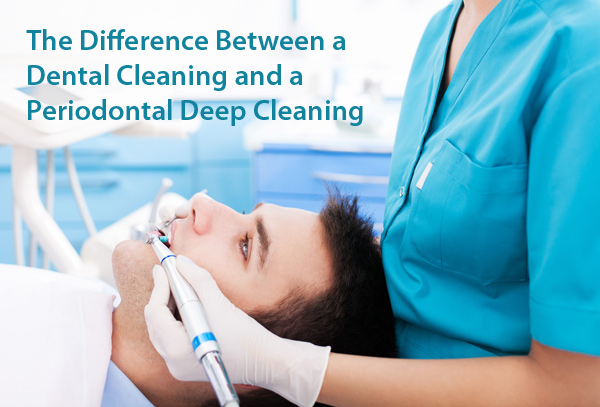Regular dental cleanings help ensure that your teeth remain healthy, strong, and free of plaque build-up, which can lead to more serious issues, such as periodontal disease, which is a gum infection that is known to cause the destruction of the jawbone as well as tooth loss if not treated early.
There are two types of dental cleanings: a general dental cleaning and a periodontal deep cleaning. Which form you are a good candidate for typically depends on whether you have good dental health or not.
General Dental Cleaning
A general dental cleaning, which is also sometimes referred to as prophylaxis in the dental field, typically involves the removal of tartar, plaque, and stains from the teeth. It is generally performed by a hygienist or a dentist during your regular dental visit.
To remove plaque, which is the clear bacteria coating that is left behind from the foods you consume, and tartar, which is hardened minerals and plaque, the dental hygienist or dentist uses an ultrasonic scaler. A dental scaler is designed to clean the visual part of the tooth, also known as the crown.
A general dental cleaning is usually painless provided the patient has good oral health. However, patients who fail to floss regularly may experience some pain during their visit as flossing helps remove approximately 40% of plaque, which makes your teeth easier to clean.
Good candidates for a general dental cleaning include:
- Individuals with general overall health
- Individuals who do not suffer from bone loss
- Individuals who do not suffer from bleeding, receding, or infected gums
Periodontal Deep Cleaning
A periodontal cleaning, which is also known as a deep cleaning or scaling and root planing, is a dental technique used to remove toxic build-up, such as bacteria and plaque, from deep within the root of the tooth where the gum connects to the bone.
This type of cleaning differs greatly from a general dental cleaning in that it is a procedure designed to treat patients with gum disease, also known as periodontal disease and periodontitis, and it is typically performed by a specialist, such as a dental hygienist.
Periodontal disease is generally marked by recessed gums, red or inflamed gums, bleeding gums, loose teeth, pain when chewing, and bad breath. However, some patients experience no symptoms at all. In fact, many people are unaware that they have periodontal disease until their dentist informs them.
Periodontal disease is most commonly diagnosed by your regular dentist during your dental visit, after which time the dentist will recommend a periodontal deep cleaning as opposed to a general dental cleaning to remove toxic build-up and retard the progression of the disease.
If you are diagnosed with periodontal disease, a periodontal cleaning is important to avoid future tooth and bone loss. Sometimes medications are also recommended along with a periodontal cleaning in order to treat the disease.
If periodontal disease is left untreated, it may require surgery, such as tissue or bone grafting or flap surgery, to treat the disease. Research shows that it may also lead to other health issues, such as heart disease and more, when left untreated.
Some risk factors that can lead to periodontal disease include:
- Genetics
- Hormonal changes
- Diabetes and other illnesses
- Smoking
- Poor dental hygiene
- Some medications
About the Author
Dr. Marichia Attala is a leading Periodontist in Nassau County. Learn more by visiting her website at NassauCountyPeriodontist.com
Additional References

Comments
Post a Comment
Posts with links will not be approved